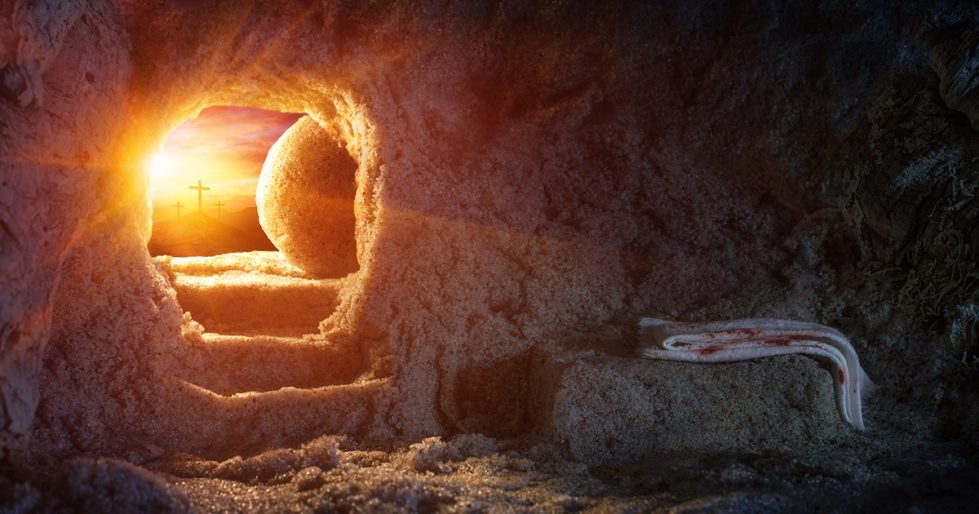Background Passages: Philippians 3:9-10; Ephesians 1:19-20; Ephesians 3:20; John 15:5,7
A week after we celebrated Easter with friends and family at our home church, we found ourselves experiencing Easter again while on vacation in eastern Europe. The majority of folks in that part of the world are Eastern Orthodox Christians who use the Julian calendar on which Easter falls one week later than it does in the States.
It was interesting to see and participate in some of their Eastern traditions. One local guide shared with us that they decorate eggs with their children just as we do. When we asked if they hide their eggs for the children to find, she gave us a look of shock and asked, “Why would you do that?” I guess it sounded mean-spirited to her.
Another Croatian family invited us to participate in their traditional “egg war.” To play this game you each hold an egg and tap the two eggs end to end. Usually, one egg will break and the other will not. The one whose egg does not break continues to test the egg against other members of the family. If yours is the last egg unbroken you are assured of one year of good luck. I lost quickly only to find out that our host was using a wooden egg.
The people we visited with indicated they would be attending church at midnight on Easter Eve and then again early Easter morning. The rest of the day would be spent with family. Our guide told us the churches would be quite full Easter Sunday, but she said, once Easter is over very few people would attend church again until Easter rolls around again.
Like those churches in eastern Europe, Easter is the most well-attended Sunday of the year in most American churches. And like those European churches, far too many American worshippers will not return to church until the following Easter holiday.
It is a sad reality of faith that far too many people acknowledge the death and resurrection of Jesus Christ but find too little time to understand what it means to live as though it mattered.
So, the question every believer must answer is what is my proper response to Easter? What is my proper response to the resurrection?
The Bible records the reactions of the individuals who encountered the resurrection. Depending on the person, the response was disbelief, fear, confusion, paralysis, and at some point, joy and celebration. For the person committed to Christ, the resurrection must be a call to action.
In his letter to the Philippian church, Paul told them that everything he had gained in life up to that point was “garbage” when compared to what he had gained in Christ. He also knew he had not received everything that Christ could offer. His life as a follower of Christ continued to be shaped and molded by the work of Christ in him. He recognized he still had much to learn so he turned to the source of all knowledge.
“I want to know Christ–yes, to know the power of his resurrection and participation in his sufferings, becoming like him in death, and so, somehow attaining the resurrection of the dead. Not that I have already obtained all this, or have already arrived at my goal, but I press on to take hold of that for which Christ Jesus took hold of me.” (Philippians 3:10-11)
It is an interesting turn of phrase in this verse that I’ve not given a great of thought to prior to the past few days. “…to know the power of his resurrection…” As a believer in Christ, we accept by faith that the resurrection Jesus’ experienced will be ours someday. That the promise of eternal life is the hope of all who believe.
The power of the resurrection is a future reality for every Christian, but I don’t think that was what Paul was thinking here. Before we can explore what he meant by the phrase, though, Paul said the surest way to avoid having an Easter-only faith is to harbor a deep desire to know the resurrected Lord. Not simply to acknowledge who he is, but to know him personally and intimately.
You hear the longing in his note to the Philippians. “I want to know Christ.” Paul’s idea of knowing Christ was to connect with him, to interact with him on a personal level. It was his passion. Absent the opportunity to walk with Jesus as his disciples did, Paul longed to see into the heart of Jesus. To understand how he could love so deeply, care so tenderly and live so faithfully. Paul earnestly and passionately wanted to have an intimate relationship with Jesus.
Any good relationship takes time spent with the one to whom we wish to connect. To get to know Jesus, takes that faith commitment as a starting point and then spends time learning the things he taught, figuring out how to apply what he taught to our lives. It speaks to the idea of following so closely in his footsteps that we become like him in the way we think, behave and the way we minister and relate to others.
To know Christ is the heartfelt goal toward which we ought to set our own lives, knowing that he is the perfect example of kindness, justice and righteousness. God said as much to Jeremiah,
“Let not the wise boast of their wisdom, or the strong boast of their strength or the rich boast of their riches but let the one who boasts boast about this: that they have the understanding to know me, that I am the Lord, who exercises kindness, justice and righteousness on earth, for in these I delight.” (Jeremiah 9:23-24)
So, our first response to the resurrection is to do what it takes to know God, to know Christ. The second part of it is to know the power of his resurrection. As I said earlier, it seems to me that Paul uses that phrase not to suggest an eternal answer, but to suggest a “here and now” experience. Paul talks about knowing the power of Jesus’ resurrection…as if it is a power and strength available to us if we can just find a way to plug into it.
I’m pretty sure we won’t find a way to connect to the power of the resurrection dressed in our Sunday best once a year on Easter.
Paul’s realization is my own. None of us has exhausted the possibilities of what God is willing to do in and through us when we plug into the power of the resurrection of Christ. Take a look at another letter Paul wrote in which he lays claim to that promise.
His opening prayer for the church in Ephesus was for enlightened hearts that see and understand the hope to which they were called and the inheritance they would receive as God’s children. He defined the hope and inheritance as…
“…the immeasurable greatness of his power toward us who believe…that he worked in Christ when he raised him from the dead.: (Ephesians 1:19-20)
The power of the resurrection.
Paul prayed that the Ephesian Christians would come to understand and tap into the unfathomably awesome power stored up for those who believe in Jesus Christ as Lord…the same power that God used to raise Jesus from the dead.
With the power of God Almighty already at work within us, we can do all things, anything, everything, he desires us to do. Just look at what he says just a little later in Ephesians.
“God is able to do far more abundantly than all that we ask or think, according to the power at work within us.” (Ephesians 3:20)
Paul is telling us we most often dream too small. Limit what we think we can do. Never really knowing what we might accomplish for God if we just plugged into the source of our strength and power or fully committed to the work he puts in front of us.
Famed 19th century theologian Charles Spurgeon called the act of raising Jesus from the tomb “as great a work as creation itself.” Jesus entered the tomb a captive of death. By the power of God, he exited the tomb as a conqueror.
Spurgeon said Paul’s desire to know the power of the resurrection was less about the power displayed in the resurrection as it was about the power that derives from it. That’s the power that Paul wanted to tap into. The power available to us today.
The power that allows us to do more than we dream we could is the power of God that he worked through Christ when he raised him from the dead. The power that allowed Jesus to conquer death is the same power available to equip us to do “far more abundantly than all we ask or think.” It is the power that enables us to be used by God to accomplish his will and purpose in and through us.
If you’re wondering how to tap into the power of the resurrection, Jesus explained it clearly to his disciples.
“I am the vine; you are the branches. If you remain in me and I in you, you will bear much fruit; apart from me you can do nothing…If you remain in me and my words remain in you, ask whatever you wish, and it will be done for you.” (John 15:5,7)
It is the connection to the vine that enables the branch to bear fruit. The branch gains its strength through its connection to the vine, its source of growth and power. The power of the resurrection is available to those who attach themselves to the vine, to Christ, drawing our growth and strength through him.
What is our proper response to Easter? What is our proper response to the resurrection?
First, we must know Christ. Not just acknowledging his presence and who he is but getting to know him personally and intimately. Striving to become more like him every day. God’s word reveals Christ in every way that matters. Hearing God’s word proclaimed every week, studying his word regularly and deeply, provides insight we need to his character and his way. Spending time with him in conversation about our hopes, our fears, our joy and our sorrow, provides that intimate connection to our Creator and Lord.
Second, we must tap into the power of his resurrection. When you read that original passage, Paul isn’t asking for more power. He’s asking for the power already available to him. We have all this power at our fingertips, but we keep acting as if we are too weak…as if we are still slaved to our past. It’s probably the biggest reason we go to church only on Easter Sunday. We have not plugged into the power at our fingertips.
The power of the resurrection…our response to the resurrection… ought to be directed more outwardly. Christianity is not just about forgiveness and overcoming sin. The Christian faith is not just an eternal solution to our sin problem. God saved us for a reason, a purpose. We are to be his agents in the world…his voice, his hands, his feet. And he gives us the power to make it so.
Through our knowing God and making that intimate connection with him, we tap into the power to not only defeat sin and gain everlasting victory over death, but we get to share in his message of love and grace to the world, to minister to the hurting and disconnected…not in our own power, but the power of the resurrected Lord.
I think that’s the idea Paul is leading us to understand. You’ll never find it in an Easter-only world. Living in the middle of all of it all…that’s the proper response to Easter.









